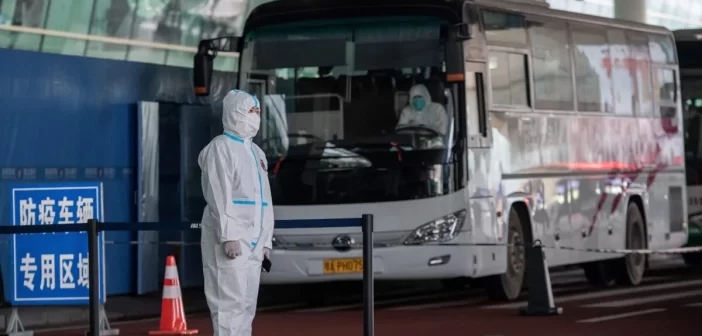The same firm that was alleged to have conducted controversial research at a laboratory in Wuhan, China—the city where COVID-19 emerged in 2019—has received a new grant to study bat viruses.
EcoHealth Alliance, which was involved in researching bat coronaviruses at the Wuhan Institute of Virology, started a multiyear study of “viral sequences and isolates for use in vaccine development,” according to a grant published online by the National Institute of Allergy and Infectious Diseases (NIAID), the agency headed by Dr. Anthony Fauci.
The study will involve bats and coronaviruses and is set to run until Aug. 31, 2027. However, its research won’t take place in China but instead will focus on Laos, Vietnam, and Burma (also known as Myanmar).
“Our hotspots risk mapping suggests countries directly to the south of China; Myanmar, Laos, and Vietnam in particular; contain regions with human-wildlife interfaces 8 and likely regular spillover of novel [coronaviruses]from bats and other wildlife,” it said.
The grant was awarded by the National Institutes of Health (NIH) on Sept. 21, with the total project funding for the year 2022 being $653,392.
EcoHealth added that its “preliminary field studies have identified novel viruses related to known zoonoses in bats and other wildlife from each of these countries” with an overall goal to “analyze the behavioral and environmental risk factors for spillover of” new coronavirus strains and identify any “wildlife-to-human spillover events.”
EcoHealth provided some $600,000 in the form of NIH sub-grants to the Wuhan virology laboratory between 2014 and 2019 for research on bat coronaviruses. Last year, some members of the 17-agency U.S. Intelligence Community said that the virus may have originated near the Wuhan lab, according to a report released on behalf of President Joe Biden.
Fauci last year insisted that no gain-of-function research was taking place at the Wuhan lab using taxpayer funds. But a top NIH official said in a letter (pdf) last year that EcoHealth admitted that the grant to EcoHealth was used to infect mice with modified bat coronaviruses.
Criticism
“It should be noted that EcoHealth Alliance was awarded a new NIH grant ten days ago, providing an additional $3.3 M over five years for a project including high-risk virus discovery research in bats in Southeast Asia,” Rutgers University professor of chemical biology Richard Ebright wrote on Twitter about the latest NIAID grant on Sept. 30.
Days after the grant was handed out, Sen. Joni Ernst (R-Iowa) introduced legislation that would ban providing federal funds to EcoHealth Alliance, specifically over its research at the Wuhan lab.
“Giving taxpayer money to EcoHealth to study pandemic prevention is like paying a suspected arsonist to conduct fire safety inspections,” she said. “NIH got it right when it canceled the funding for the experiments EcoHealth Alliance was conducting with China’s state-run Wuhan Institute. In addition to violating multiple federal laws, EcoHealth has still not turned over documents about these dangerous studies that NIH has requested on multiple occasions that could offer vital clues to the origins of the COVID-19 pandemic.”
In an interview with Science.org last year, EcoHealth chief Peter Daszak said that he is the victim of “an antiscience attack” and claimed that he was warning about a coronavirus pandemic for 15 years before COVID-19 spread across the world.
“If a small group of scientists were absolutely correct in their predictions, why are we now putting them on the pyre in the middle of the village, dancing around, and burning them alive?” Daszak asked in the interview. “That’s what really sickens me to my stomach.”
The NIH and EcoHealth Alliance didn’t respond by press time to a request by The Epoch Times for comment.
Source: The Epoch Times

